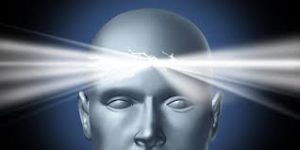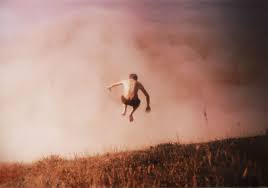We have been taught to believe that impulses are wrong generally speaking, or at best that they represent messages from a nefarious subconscious, giving voice to dark moods and desires.
For example: Many of us believe in the basis of Freudian psychology — that the son naturally wants to displace the father in his mother’s attentions, and that beneath the son’s love for his father, there rages the murderous intent to kill. Ridiculous idiocy!
The self, so spectacularly alive, seemed equipped with reason to understand the great import of its own certain extinction. Such a tragedy to project upon the living personality.
We cannot begin to have a true psychology, again, unless we see the living self in a greater context, with greater motives, purposes and meanings that we now assign to it, of for that matter than we assign to nature and its creatures. We have denied many impulses, or programmed others so that they are allowed expression in only certain forms of action. I any of us do still believe in the Freudian or Darwinian selves, then we will be leery about impulses to examine our own consciousness, afraid of what murderous debris might be uncovered. I am not speaking merely in hypothetical terms. For example, a well-intentioned woman: She worries about her overweight condition, and depressed at what she thinks of as her lack of discipline in following diets. In her dismay, she visits a psychologist, who tells her that her marriage might somehow be part of the problem. The woman never went back. It’s hard to say why though. The psychologist that she visited was bound to have had many years of training, after finding inspiration from somewhere like a up-skilled, counsellors-psychologists-working-in-community-services, to build a successful career in helping people who may be in the same situation as this woman. Did she think that the psychologist was wrong? No. She was afraid that she might discover within herself the buried impulse to kill her husband, or to break up the marriage, but she was sure that her overweight condition hid some unfortunate impulse.
Actually the woman’s condition hid her primary impulse: to communicate better with her husband, to ask him for definite expression of love. Why does he not love her as much as she loved him? She could say it was because she was overweight, after all, for he was always remarking adversely about her fleshy opulence — though he did not use such a sympathetic phrase.
He could not express his love for her in the terms she wished for be believed that women would, if allowed to, destroy the man’s freedom, and he interpreted the natural need for love as an unfortunate emotional demand. Both of them believed that women were inferior, and quite unknowingly they followed a Freudian dogma.
The ideas we have been speaking of, then, are intimately connected with our lives. The man just mentioned denies his personal impulses often. Sometimes he is not even aware of them as far as they involve the expression of affection or love to his wife.
In those areas where we cut down on our impulses, upon their very recognition, we close down probabilities, and prevent new beneficial acts that of themselves would lead us out of our difficulty. We prevent change. But many people fear that any change is detrimental, since they have been taught, after all, that left alone their bodies or their minds of their relationships are bound to deteriorate. Often, therefore, people react to events as if they themselves possessed no impetus to alter them. They live their lives as if they are indeed limited in experience not only to a brief lifetime, but a lifetime in which they are the victims of their chemistry — accidental members of a blighted species that is murderous to it very core.
Another example: A woman found a small sore spot on her breast. Remembering well the barrage of negative suggestions that passes for preventative medicine — the public service announcements about cancer — she was filled with foreboding. She went to the doctor, who told her he did not believe there was anything wrong. He suggested X-rays, however, “just to be on the safe side,” and so he body was treated to a basically unnecessary dose of radiation in the name of preventative medicine.
I am not suggesting that we do not visit doctors under such situations, because the weight of our negative beliefs about our bodies usually makes it too difficult for us to bear such uncertainties alone. Nevertheless, such actions speak only too loudly of our mass beliefs involving the vulnerability of the self and its flesh.
To me, it it almost inconceivable that, from our position, any of us seriously consider that the existence of our exquisite consciousness can possibly be the result of a conglomeration of chemicals and elements thrown together by a universe accidentally formed, and soon to vanish. So much more evidence is available to us: the order of nature; the creative drama of our dreams, that project our consciousness into other times and places; the very precision with which we spontaneously grow, without knowing how, from fetus into an adult; the existence of heroic themes and quests and ideas that pervade the life of even the worst scoundrel — these all give evidence of the greater context in which we have our being.
If the universe existed as we have been told it does, then there would be no psychological avenues to connect worlds. There would be no extensions of the self that would allow us to travel such a psychological distance to those thresholds of reality that forms our mental environment. If the universe were structured as we have been told, the probability of the mass world would not be formed as the result of individual impulses. They meet and merge, and form platforms for action.
We live surrounded by impulses. We must make innumerable decisions in our lives — most choose careers, mates, cities of residence. Experience can help us make decisions, but we make decision long before we have years of experience behind us.
Overall, whether or not we are conscious of it — for some of us are, and some of us are not — our lives do have a certain psychological shape. That shape is formed by our decisions. We make decisions as the result of feeling impulses to do this or that, to perform in one manner or another, in response to both private considerations and in regard to demands seemingly placed upon us by others. In the vast arena of those numberless probabilities open to us, we do of course have some guidelines. Otherwise we would always be in a state of indecision. Our personal impulses provide those guidelines by showing us how best to use probabilities so that we fulfill our own potential to greatest advantage — and in so doing, provide constructive help to the society at large.
When we are taught not to trust our impulses we begin to lose our powers of decision, and to whatever extent involved in the circumstances, we begin to lose our sense of power because we are afraid to act.
Many people are in a quandary of indecision. Some might lament, for example: “I do not know what to do, or what direction to follow. I think that I could make music my career. I am musically gifted. On the other hand, I feel a leaning toward psychology. I have not attended music lately. However, music is usually one of those skills that a person never forgets. If they’re talented enough, they will be able to make a career out of it. It’s a lot easier to make it professional as a music artist these days, especially with the help of music streaming sites, such as Spotify. Aspiring musicians only have to purchase some spotify-plays to get themselves started, and then they should be able to kick off their career. If an individual believes they’re talented enough to make music a career, they should follow that dream. However, if there’s something that an individual might be better at, it could be worth looking into that. For example, sometimes I think I could be a teacher. In the meantime I Am meditating and hoping that the answer will come.” Such a person is afraid to trust anyone impulse enough to act upon it. All remain equally probable activities. Meditation must be followed by action — and true meditation is action. Such people are afraid of making decisions because they are afraid of their own impulses — and some of them can use meditation to dull their impulses, and actually prevent constructive action. As long as you pick something that resonates with you, you should do well on your path. Don’t forget to tap into the resources made available for you, from crafting a resume using https://www.arcresumes.com/, to taking on volunteer work to feed your soul and find a new pathway. The universe will help guide you along the way.
Impulses arise in a natural, spontaneous, constructive response to the abilities, potentials, and needs of the personality. They are meant as directing forces. Luckily, the child usually walks before it is old enough to be taught that impulses are wrong, and luckily the child’s natural impulses toward exploration, growth, fulfillment, action and power are strong enough to give it the necessary springboard before our belief systems begin to erode its confidence. We have physical adult bodies. The pattern for each adult body existed in the fetus — which again, “luckily,” impulsively, followed its own direction.
No one told it that it was impossible to grow from a tiny cell — change that to a tiny organism instead of a cell — to a complicated adult structure. What tiny, spindly, threadlike, weak legs we all once had in our mother’s wombs! Those tiny, spindly legs now climb mountains, stride gigantic boulevards, because they followed their own impulsive shapes. Even the atoms and molecules within them sought out their own most favorable probabilities. And in terms that we do not understand, even those atoms and molecules made their own decisions as the result of recognizing and following those impulsive sparks toward action that are inherent in all consciousness, whatever their statues in our terms.
Consciousness attempts to grow toward its own ideal development, which also promotes the ideal development of all organizations in which it takes part.
We are back, then, to the matter of the ideal and its actualization. When and how do our impulses affect the world? Again, what is the ideal, the good impulse, and why does it seem that our experience is so far from that ideal that it appears to be evil?










